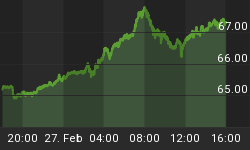The big news last week was the Yuan revaluation by a little more than 2%. The Yuan will no longer pegged to the U.S. dollar but will now float against a basket of currencies. Does this mean the dollar has now lost its status as the world's premier reserve currency as some fear? Not yet, for we haven'tquite arrived at that stage.
It is argued by some that the yuan float will automatically mean trouble for the dollar and big trouble for the U.S. economy in the near-term, but the fear mongers have been saying this for years. Every time talk begins of a foreign country reducing its dollar holdings (such as South Korea) or does anything that could be construed as negative for the dollar, it is interpreted to mean the U.S. has lost its premier status and will be overtaken in short order andset in a lower place in the global hierarchy.
But as Don Hays is quick to point out, the U.S. is still the world's "currency enforcer" and the dollar is still the primary currency target of the world's economies. He also recently pointed out that the Indian Rupee may be the recipient of a "closet peg" to the dollar as India has begun pushing for more labor reforms to reduce bureaucracy and become even more competitive with China. "If we reduce purchases of Chinese goods slightly as a result of this slight increase in the value of the Yuan, we will likely be making up the difference by buying the goods from India," says Hays. The long and short of it is that if India is pegging its currency, they will have to purchase U.S. treasuries tokeep their currency from rising as a result.
In light of the hype and hoopla China receives daily in the press, it is easy to forget that the U.S. is still the world's premier consumer economy and China's industrial sector was set up primarily for supplying America's consumer economy with cheap goods to keep the world's leading engineof growth up and running until global economic integration is complete.
Business Week columnist Jeffrey Garten recently made reference to this by calling on Washington to lead the effort to build a "new global commercial order" (his term). This essentially is the same structure I've been calling the Global Economic Order (GEO) and Garten recognizes the starring role the U.S. has in helping to integrate the economies of the world as painlessly as possible. Most emerging economies are heavily dependent on the U.S. consumer and can't afford to let their currency appreciate too much against thedollar without hurting their exports, therefore, the dollar is still king.
While the U.S. press talks in terms about China being the proverbial "800-pound gorilla," Donald Rowe of the Wall Street Digest points out that the commercial and residential real estate boom in China (in part to impress visitors to the 2008 Olympics in Beijing) is in peril due to the technical bankruptcy of the Chinese banking system. Communist party insiders don't expect these real estate loans to be repaid, according to Rowe. "Most Chinese and American visitors to China expect China to implode from the weight of astronomical, unserviceable real estate debt," observes Rowe. "Washington and Wall Street are both strangely quiet about the looming crash of China."

The Chinese stock market, much like the U.S. stock market, discounts trouble well in advance and is therefore an anticipatory barometer. China's stock market has been in a bear market since 2001 and only now shows signs of trying to put in at least a temporary bottom. Has the 4-year bear market in China's SSE Composite Index foretold of an industrial recession (or worse) for China? Will the drying up of global liquidity that economists such as Ed Yardeni speak of have a severe impact on China? Historically, financial problems typically come to a head during the August-October time frame, when global financial liquidity is weakest. Some analysts wonder whether the Fed will rapidly expand the M3 money supply to keep China's problems from washing up on our shores.















